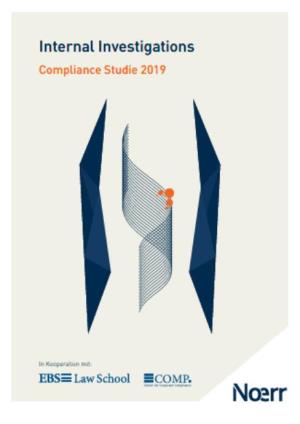Supervisory board rarely involved in internal investigations in practice, compliance study by Noerr and EBS Law School reveals

If a company launches an internal investigation, this decision is a management issue. This is one of the findings of the “Internal Investigations – Compliance Study 2019” presented by law firm Noerr and the Center for Corporate Compliance at EBS Law School. In contrast, the supervisory board is rarely involved in such investigations. The triggers for an internal investigation are mostly offences against property, often covering breaches of internal compliance, data protection rules and capital markets law. Noerr partner Sophia Habbe will be presenting the study together with Noerr partner Christian Pelz and Professor Michael Nietsch from EBS Law School at today’s Noerr Compliance Day in Frankfurt.
In the draft German Act on Combatting Corporate Crime, which has currently reached the stage of a government bill dated 15 August 2019 (“Corporate Penalty Act”), the legislator provides rules for internal investigations for the first time. In the light of the eagerly awaited draft bill, the study’s authors asked interviewees in what cases companies launch internal investigations, who decides to do so, how investigations are carried out and under what circumstances external advisors are involved. Interviews were carried out with a total of 300 decision-makers from companies with at least 250 employees during the summer of 2019.
Launching internal investigations is a matter for the management
Internal investigations are mostly launched by the company’s management (52%), and to a lesser extent by compliance departments (23%). In 70% of companies, the top management is at least involved in the decision to carry out internal investigations. “Internal investigations are a management topic which management board members and directors should not try to dodge,” says Sophia Habbe, a partner based in Noerr’s Frankfurt office and co-head of Noerr’s Compliance & Internal Investigations practice group. She points out that a company’s management should ensure that the legal requirements are met and has to remedy any deficits in the company’s organisational structures which encourage rule-breaking. “But whether organisational deficits exist can only be established by carefully investigating the matter. It’s often not enough to just deal with the alleged breach of rules.”
Supervisory board has to familiarise itself with internal investigations
The supervisory board is far less frequently involved in internal investigations than the management. Those surveyed report that the supervisory body generally informed in advance that internal investigations are being carried out in only 37% of the companies. If there is a suspicion of serious breaches of duty, the figure is 46%. If there is a suspicion that members of the management are involved in breaches of duty, the supervisory board is informed in 64% of cases.
“The low involvement of the supervisory board is astonishing, because it has a special significance under company law as a corporate body responsible for supervising the management when compliance breaches may have occurred,” stresses Sophia Habbe. She says that the supervisory board can only live up to its role as a supervisory body if it makes sure it receives the relevant information in order to familiarise itself with the status of any internal investigation. She says that if members of the management or executive board have been accused of participating in compliance-relevant breaches, the supervisory board is obliged to take action itself and to launch its own investigations.
Increased significance of internal investigations due to new Corporate Penalty Act
With the introduction of corporate criminal law, internal investigations will become even more relevant for members of the management and supervisory boards because the legislator has created incentives both to expand compliance management systems and to carry out internal investigations. “Companies can hope to have their fines reduced – or even be completely exempted from penalties – if they have functioning compliance management systems in place or if they clear up the matter by conducting internal investigations and share their findings with the authorities,” underlines Christian Pelz, partner and criminal law expert at Noerr.
“Now that corporate criminal law is being introduced, we will see a sharp rise in the number of investigations conducted,” says Sophia Habbe. Under the draft bill, whether proceedings are launched against a company is not at the discretion of public prosecutors. “If there are enough factors indicating that a crime is attributable to a company, investigations are mandatory.”
“The new corporate criminal law is intended to protect companies who abide by the law,” points out Matthias Korte. Mr Korte, department head at the Federal Ministry of Justice and Consumer Protection, will be presenting the draft bill at the Compliance Day. He stresses that “For this reason, the penalties imposed have to be high enough to motivate companies to prevent offences from being committed in their own sphere of influence. The introduction of the principle of legality ensures that, in future, where a company’s registered office is located will no longer dictate whether or not proceedings are commenced in the first place. The new law will create legal certainty for businesses by setting clear procedural guidelines and rules which take into account compliance and internal investigations.”
The results of the study show that investigations are almost always initiated when there is a suspicion that employees are lining their own pockets and if there is a suspicion of corruption and bribery (in each case 92%). Investigations are also carried out very often if there have been possible breaches of compliance rules (86%) or criminal offences (83%) and for suspected breaches of data protection rules (81%).
Most companies also start investigations if there have been possible breaches of capital markets rules (61%). “We know from our study on crisis management last year that many companies see very high compliance risks in this area due to the increasing complexity of the regulations in this are,” says Sophia Habbe. This relates in particular to the unauthorised forwarding of inside information, the failure to comply with regulatory announcements or mistakes in ad hoc announcements.
External experts investigate complex matters
External advisors are often involved in investigations. This is mostly the case when the subject matter of an investigation is particularly complex (64%), if the management is affected by the accusations being investigate (51%) or if possible criminal acts are involved (50%). At the same time, 72% of those questioned attach great value to protection of knowledge and sources from an internal investigation, although only external advisors can secure a “legal privilege”.
The Noerr Compliance Day is an established conference for experts from Germany and abroad. It is moderated by Sophia Habbe and Torsten Fett, who are the joint heads of Noerr’s Compliance & Internal Investigations practice group, and by Thomas Klindt, Noerr partner and co-editor of the journal Zeitschrift für Corporate Compliance (CCZ).
The “Internal Investigations – Compliance Study 2019” can be downloaded here.
Well
informed
Subscribe to our newsletter now to stay up to date on the latest developments.
Subscribe now









